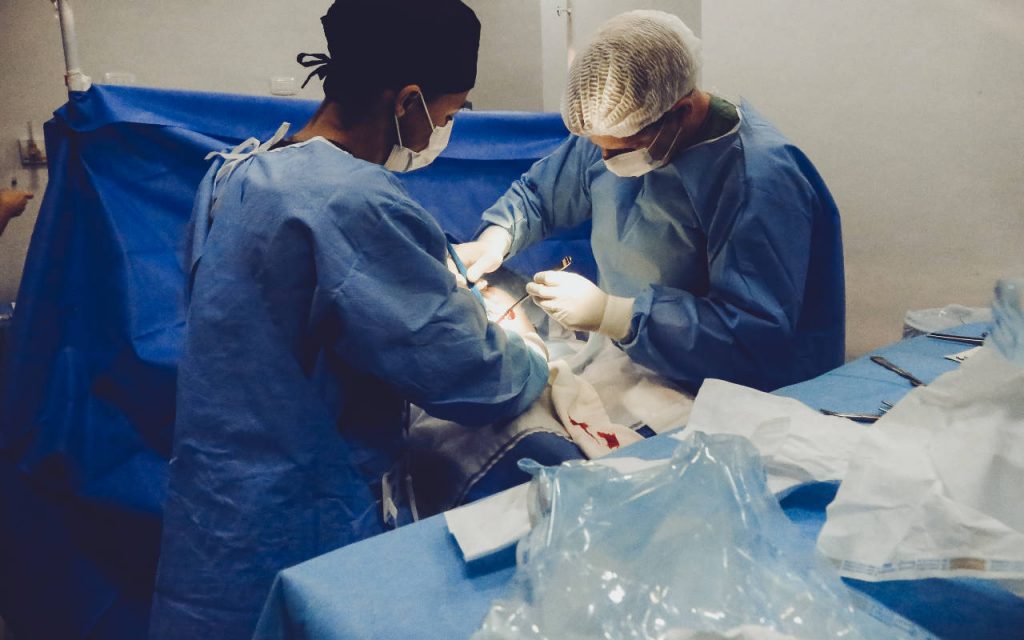Modern medicine doesn’t function without plastic – at all levels and phases. Paramedics in time-critical emergency situations rely on plastics, and not just in packaging.
Learn more: How to choose medical packaging
Surgeons performing operations over hours need reliable materials. Nurses need PPE. Patients need to be kept safe from disease, and the population needs to be protected from contaminants. Healthcare workers are exposed to all kinds of pathogens and nasties every day. Protecting them and the people they care for is vitally important. Plastic – and in particular medical-grade polythene – is the only viable way to achieve this.
The hard truth about medical plastics? It’s that we simply can’t live without them. But as it turns out, we can die without them either.
There’s a whole other branch of medicine we don’t talk about. One which might just sway even the most anti-plastic person. And it’s the hardest truth of all; death.

Cadaver and mortuary plastics: polythene is the only option
As much as we don’t like to think about it, we’re all going to pass on one day. And when we do, we’d probably all wish for the bodies we piloted for our whole lives to be treated with dignity and respect.
Preparing the deceased is a very involved and delicate process, and polythene has many roles in this.
In mortuaries and during the transportation of deceased individuals, polythene bags are really the only option. Heavy duty polythene, treated with specialist polythene additives, helps to maintain hygiene and the integrity of the deceased person for as long as possible. Polythene is a highly effective barrier material, which is better suited to this task than any other we currently have available.
CFS (centre fold sheeting) is often used to line coffins, cover work surfaces and to provide quick cover.
But bodies aren’t always destined to be buried or cremated. Sometimes, people donate their remains to science. Other times, bodies need to be preserved for forensic study by police.
In anatomical laboratory settings, polythene bags and body wraps are used to cover and protect cadavers for cold storage. Additives can be used to keep the polythene from becoming brittle.
Diseases spread without medical bags and plastics, and balancing this against environmental impact is extremely difficult. Of course, we all want to do our bit for the environment, even in death. But when it comes to preserving our dignity and preventing the spread of disease, we have to trust that polythene is the right choice for the greater good.
Now, you might be wondering why we’ve chosen this rather macabre topic of discussion. And no, it’s not because Halloween is just around the corner… It’s because in our part of the world, we are approaching the toughest time for healthcare professionals: winter.
Winter pressures can stretch resources to their limits – and beyond. This makes every patient time-critical. And when time is of the essence, you need fast solutions.
Healthcare professionals need speed
While polythene itself does not directly speed up medical procedures, it does contribute to the efficiency and effectiveness of medical practices.
For example, PPE (items like tabards) reduces the risk of contamination, eliminates the need for sterilisation or cleaning, and makes medical procedures more efficient. More patients can be seen in the same amount of time, and workers have less to worry about.
Medical polythene bags are used as sterile packaging, as well as hazardous waste bags, for safe disposal of harmful contents.
Medical grade polythene sheeting can also be used to cover imaging equipment – like X-ray machines and MRI machines – making cleanup, disinfection and patient turnaround much faster. This practice can also prolong the lifespan of the equipment.
The truth about medical polythene is that it contributes to the convenience, hygiene and safety of medical procedures. It makes healthcare outcomes better, and gives healthcare professionals quick access to excellent tools. It minimises contamination risk, is highly cost-effective, and in time-critical settings (including winter pressures in hospitals), it is vitally important.
In life, and in death, we rely on polythene. That’s why it’s so important to get medical polythene right.
Medical polythene bags – high performance medical plastics
Get medical polythene bags, designed to your exact specifications. Get a quote now, or call us on 01773 820415.


